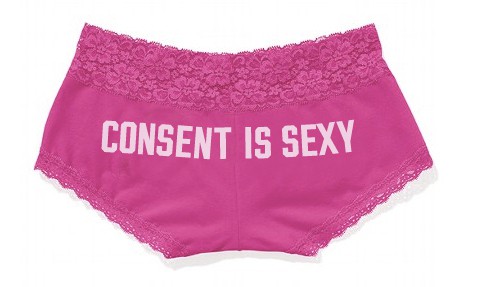“Consent is Sexy!” is a kind of go-to buzz phrase used often by well-intentioned groups and individuals seeking to promote safe sex and educate about rape culture. While the effort is laudable, this premise needs work. Here are six reasons I think the concept of “consent is sexy” isn’t doing what it thinks it’s doing.
1. The obvious one —consent is mandatory. Even if you’re doing some BDSM-ish “consensual non-consent” play, there is still consent, right there at the top of the phrase. Partners can have a safe word specifically so that “No” can sometimes mean “Yes.” Otherwise, consent needs to be a 100% fact in all sexual encounters between more than 1 person. End of convo.
2. Branding something as “sexy” as a way to get younger people to buy into it is pathetic. The Consent Is Sexy program seems to mostly be aimed at University-aged students, who I’m sure appreciate the campaign’s reeking condescension. It’s like airing a PSA that says, “Seatbelts are Sexy.” No they aren’t—and that doesn’t make wearing one any less important.
Here are some other things that, like consent, are not sexy but actually just kind of important/required: flossing; returning library books; paying your bills; not murdering people; doing your laundry; voting; going to see your doctor regularly; feeding your pets; not physically neglecting your pets or family members; driving safely; respecting other people’s boundaries; eating vegetables; installing smoke alarms in your home. You know, grown-up shit. It’s not all sexy, and it doesn’t have to be.
3. The campaign ignores key lessons young people must learn on their own. So much of partner sex is a series of learning about each other’s bodies and various sexual responses. It’s about opening up and trying new things and explaining what you like and don’t like. Stopping at every turn to obtain a “Yes” can make things feel stilted and seem like overkill, especially in a long-term, trusting relationship. There are more intricate conversations to be had. The “consent is sexy” approach also demands a type of sexual confidence that many young people simply don’t possess, particularly when it comes to your classic one-night stand. A simple three word catch phrase doesn’t teach those skills.
4. It ignores the way young people actually interact. I can’t count the amount of times I’ve playfully demurred in order to get someone to come hither. Pretending that this dynamic isn’t in play is disingenuous and doesn’t account for the real-life way people flirt, hook up and, frankly, fuck. Popular culture is rife with the idea that as long as you don’t get a piercing “No,” you’re all set. Getting a “Yes” at every turn takes a lot more work and patience and all the shit that young people just don’t like to do.The option to turn that no upside down seems like a huge part of not only pickup culture but sexual politics in general.
5. I’m pretty tired of “sexy” being the most important thing, always. We already have to face billion-dollar industries which pressure us to be sex-sexy-sexier a thousand different ways. Now our consent does too? Why can’t our consent be something that is sought after, admired and respected? Like a shabby but sharp old professor who doesn’t teach any more but still holds office hours occasionally?
6. It oversimplifies consent to the point of losing all meaning. Here’s this thing – consent – which is a turn-on and sexually-charged thing that you want. So now what? Do we goad sexual partners into “consenting”? Because that makes whatever happens afterwards not only OK, but also somehow sexy? Nope Nope Nope. Enthusiastic consent is an important concept and lesson to teach that goes far beyond a simple “Yes.” Additionally, it muddies the already murky waters about what actually constitutes rape or not. Gaining consent at one point in time, for one act, does not mean that you have clearance to run off and do whatever you want.
Non-consent comes in many forms: being drugged or assaulted while drugged; being underage or otherwise unable to give consent; being intoxicated or otherwise incapable of consent; being pressured, fooled or forcefully made to engage in sex acts you don’t want to; and the less-common but still pervasive stranger assault. In none of these instances does convincing the perpetrator or the victim that “Consent Is Sexy” change the reality of what happened. It gives both the rapist and the victim a binary: “Sexy vs Rape.” The opposite of non-consent isn’t “sexiness.”



 Follow Us On Instagram
Follow Us On Instagram
